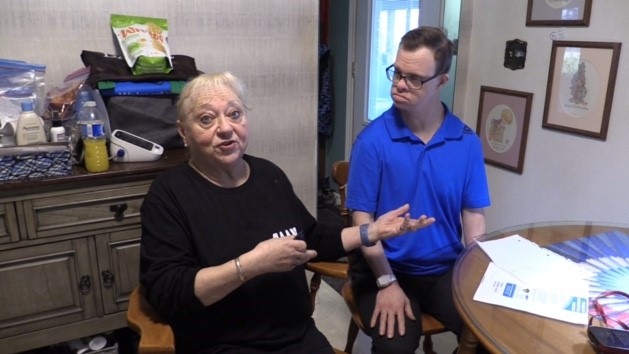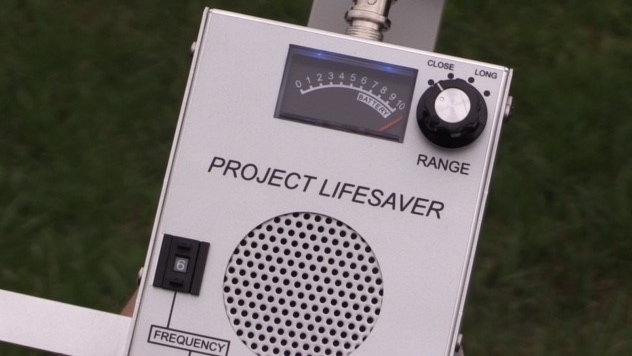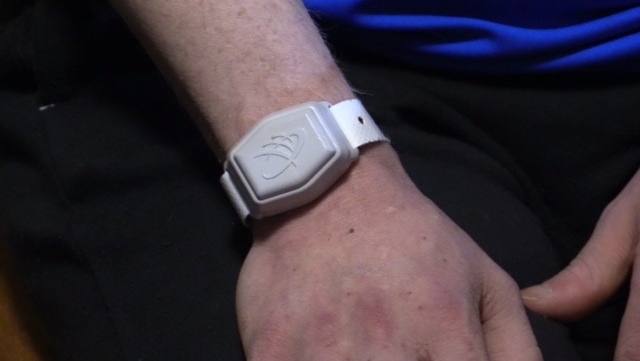Clinton man with Down syndrome reported missing, found by 'Project Lifesaver'
Brian Gray-Hicks likes to be active, and goes for daily walks near his home in Clinton.
“Our Brian usually goes for a walk everyday. Most days he’s goes in the mornings,” said his guardian Barbara Hicks.
But last Tuesday night, Brian, who has Down syndrome, went for a walk around 6 p.m. He didn’t come home at his expected time.
Barbara, his guardian since Brian was 18, called 9-1-1. He was found shortly thereafter, thanks to the small transmitter on his right arm.
When asked how he felt when the police came along, Brian said, “Better. A lot better.”
Brian, who is 49 years old, very hard of hearing, and largely non-verbal.
“They located him just in time. He had wandered onto some private property, and there were two dogs being aggressive with him. And he was very emotional and scared,” said Huron OPP Community Services Officer Craig Soldan.
 Barbara Hicks and Brian Gray-Hicks, seen on April 18, 2024 in Clinton. (Scott Miller/CTV News London)
Barbara Hicks and Brian Gray-Hicks, seen on April 18, 2024 in Clinton. (Scott Miller/CTV News London)
“The dogs didn’t hurt you, but they could have. Yeah. So this was very important to have that bracelet on,” say Barbara and Brian.
The transmitter on his wrist is part of Project Lifesaver. The Hicks invested in the program a few months ago after Brian’s second time going missing in the past 12 months.
Each transmitter emits an automatic tracking signal. Search teams can pinpoint that signal from eight to 10 miles away.
In Brian’s case, he was found within minutes of being reported missing.
“In this case, it was a real lifesaver for us. We know that we can fall back on that,” said Barbara, who now has Brian carry a timer with him to know when to come home.
 Project Lifesaver equipment used to help locate missing people, seen on April 18, 2024 in Clinton. (Scott Miller/CTV News London)
Project Lifesaver equipment used to help locate missing people, seen on April 18, 2024 in Clinton. (Scott Miller/CTV News London)
Even though it’s older VHF radio frequency technology, Project Lifesaver is more reliable than GPS, especially in dense, wooded areas, said Soldan.
That’s because most remote areas, where people typically go missing, won’t have cell phone or GPS signal at all.
“So with radio frequency, it’s actually better, more accurate, even though it’s older technology,” said Soldan.
In Huron County, Project Lifesaver is managed by Huron County Paramedics. They said the program is for anyone with cognitive impairment, of any age.
“For anyone that wanders. Anyone with dementia, Alzheimer’s, any cognitive impairment. This is something that can literally save a life. Most sign ups are through referrals through a family physician. There are other ways of doing it, but that’s probably the best way to sign up. We have 15 to 20 people signed up right now,” said Huron County Community Paramedic Christian Atkinson.
 Project Lifesaver equipment used to help locate missing people, seen on April 18, 2024 in Clinton. (Scott Miller/CTV News London)
Project Lifesaver equipment used to help locate missing people, seen on April 18, 2024 in Clinton. (Scott Miller/CTV News London)
The Hicks are certainly happy Brian has a Project Lifesaver transmitter on his wrist, and encourage others to sign up, as well.
“You would really promote people having this, Brian?” “Yeah.” “Because it helped you, right?” “Yeah, it did,” said Barbara and Brian.
Huron County’s Project Lifesaver has a one time set up fee, and $10/month maintenance fee.
To sign up by calling Huron County Community Paramedicine at 1-866-340-9357 ext. 1.
You can learn more about the overall program by visiting their website.
CTVNews.ca Top Stories

BREAKING Foreign Affairs Minister Melanie Joly will not seek Liberal leadership
Foreign Affairs Minister Melanie Joly will not run for Liberal leadership, CTV News has confirmed. Up to now, Joly was widely considered a potential successor to Prime Minister Justin Trudeau, who recently announced he would resign as leader of the Liberal party.
Canadian 'Super Scooper' plane grounded after hitting civilian drone over Los Angeles wildfires
A Canadian 'Super Scooper' aircraft fighting the Palisades Fire in Los Angeles had to be grounded after it hit a drone flying in restricted airspace over the devastating blaze on Thursday, the local fire department said.
Trump appears virtually in New York court to be sentenced in his hush money case before inauguration
In a singular moment in U.S. history, president-elect Donald Trump faces sentencing Friday for his New York hush money conviction after the nation's highest court refused to intervene.
'Mama is waiting for you': Woman appeals for return of 3-year-old son after ex-husband failed to bring him back to Canada
The mother of a three-year-old Toronto boy is urging her former husband who is wanted in a parental abduction investigation to bring their son back to Canada from India.
NEW Federal Liberals to pick new leader on March 9 as rules for leadership race are defined
The Liberal Party of Canada have announced leadership race rules late Thursday, including a significant increase in entrance fees and a requirement for voters to be Canadian citizens.
Wildfires latest: 10 confirmed dead as firefighters work to contain blazes in Los Angeles area
Firefighters are hoping for a break Friday from the fierce winds that have fueled massive blazes in the Los Angeles area, killing 10 people, obliterating whole neighborhoods and setting the nation’s second-largest city on edge.
Is the Hollywood sign on fire?
As fires scorch Los Angeles, fake images and videos of a burning Hollywood sign have circulated on social media.
This professor traded her tenure in for Wi-Fi as a digital nomad. Here's what she learned
CTVNews.ca asked Canadians who've embraced the digital nomad lifestyle, or have done so in the past, to share their stories — the challenges, triumphs and everything in between.
'Not going to happen': Markham jewelry store owner fights off robbers with broomstick
When three masked individuals entered Jewellery Forever and started smashing a display case, Jerry Sorani knew he had to defend the store he has owned for the last 16 years. So, he grabbed a nearby broomstick.






























